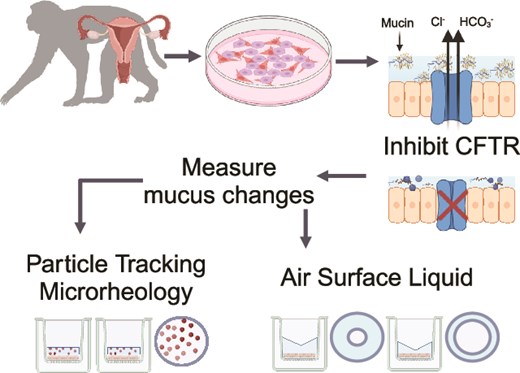-
Views
-
Cite
Cite
Rachel J Looney, Mackenzie Roberts, Matthew Markovetz, Rachelle Godiah, Shan Yao, Kirsti Golgotiu, Shuhao Wei, Chris Cellucci, Leo Han, In vitro inhibition of the CFTR ion channel in the Macaca mulatta cervix thickens cervical mucus, Biology of Reproduction, 2025;, ioaf103, https://doi.org/10.1093/biolre/ioaf103
Close - Share Icon Share
Abstract
Cervical mucus changes throughout the menstrual cycle in response to hormonal fluctuations, regulating access of sperm and pathogens to the reproductive tract. CFTR is an anion channel that plays a critical role in mediating epithelial mucus secretions. Primary endocervical cells obtained from rhesus macaques Macaca mulatta were cultured using conditional reprogramming and treated with vehicle controls or CFTR inhibitors. In order to measure changes in hydration and viscosity of secreted mucus, we adapted two airway mucus assays, airway surface liquid and particle-tracking microrheology, for our endocervical culture system. Endocervical cells treated with CFTR inhibitors demonstrated dehydrated, thicker mucus secretions compared to controls in both assay outputs. Our studies suggest that CFTR may be an important mediator of fertility changes and provide experimental evidence for the infertility phenotype seen in women with cystic fibrosis. Additionally, assays developed in these studies provide new endpoints for assessing cervical mucus changes in vitro.





